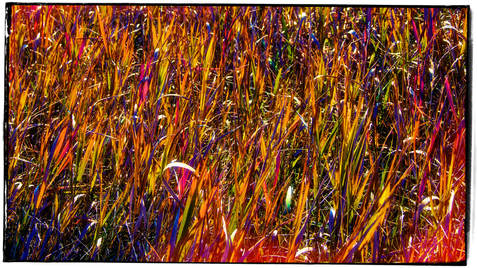 Photo by ATHULRAJ KV on Unsplash
Photo by ATHULRAJ KV on Unsplash
Acts 2:1-4, 14-21, 38-41 NIV When the day of Pentecost came, they were all together in one place. Suddenly a sound like the blowing of a violent wind came from heaven and filled the whole house where they were sitting. They saw what seemed to be tongues of fire that separated and came to rest on each of them. All of them were filled with the Holy Spirit and began to speak in other tongues as the Spirit enabled them. Then Peter stood up with the Eleven, raised his voice and addressed the crowd: “Fellow Jews and all of you who live in Jerusalem, let me explain this to you; listen carefully to what I say. These people are not drunk, as you suppose. It’s only nine in the morning! No, this is what was spoken by the prophet Joel: “ ‘In the last days, God says, I will pour out my Spirit on all people. Your sons and daughters will prophesy, your young men will see visions, your old men will dream dreams. Even on my servants, both men and women, I will pour out my Spirit in those days, and they will prophesy. I will show wonders in the heavens above and signs on the earth below, blood and fire and billows of smoke. The sun will be turned to darkness and the moon to blood before the coming of the great and glorious day of the Lord. And everyone who calls on the name of the Lord will be saved.’ Peter replied, “Repent and be baptized, every one of you, in the name of Jesus Christ for the forgiveness of your sins. And you will receive the gift of the Holy Spirit. The promise is for you and your children and for all who are far off—for all whom the Lord our God will call.” With many other words he warned them; and he pleaded with them, “Save yourselves from this corrupt generation.” Those who accepted his message were baptized, and about three thousand were added to their number that day. (Emphasis mine)
While Christians celebrate Pentecost as the birthday of the Church we really don't understand its significance in God’s plan of salvation, beginning with Abraham and reaching its zenith with the death, burial, resurrection, and ascension of Jesus Christ.
Genesis 22:15-18 NIV The angel of the Lord called to Abraham from heaven a second time and said, “I swear by myself, declares the Lord , that because you have done this and have not withheld your son, your only son, I will surely bless you and make your descendants as numerous as the stars in the sky and as the sand on the seashore. Your descendants will take possession of the cities of their enemies, and through your offspring all nations on earth will be blessed, because you have obeyed me.”
Acts 2:29-33 NIV “Fellow Israelites, I can tell you confidently that the patriarch David died and was buried, and his tomb is here to this day. But he was a prophet and knew that God had promised him on oath that he would place one of his descendants on his throne. Seeing what was to come, he spoke of the resurrection of the Messiah, that he was not abandoned to the realm of the dead, nor did his body see decay. God has raised this Jesus to life, and we are all witnesses of it. Exalted to the right hand of God, he has received from the Father the promised Holy Spirit and has poured out what you now see and hear.
Acts 4:8-12 NIV Then Peter, filled with the Holy Spirit, said to them: “Rulers and elders of the people! If we are being called to account today for an act of kindness shown to a man who was lame and are being asked how he was healed, then know this, you and all the people of Israel: It is by the name of Jesus Christ of Nazareth, whom you crucified but whom God raised from the dead, that this man stands before you healed. Jesus is “ ‘the stone you builders rejected, which has become the cornerstone.’ Salvation is found in no one else, for there is no other name under heaven given to mankind by which we must be saved.” (Emphasis mine)
In that post was an excerpt from Michael Norton’s book Unlocking The Secrets Of The Feasts;
Explicit parallels and contrasts are evident between the Feast of Pentecost in the New Testament and the Feast of Weeks in the Old Testament. The Feast of Weeks is the same feast the disciples observed in the New Testament, known as the Feast of Pentecost. At the first Feast of Weeks, God provided the law. God had given the children of Israel freedom from bondage and slavery, so He then gave them the law to guide them in living.

I didn’t really understand the significance of those parallels and contrasts until I read an excerpt from The Rock, The Road, And The Rabbi, by Kathie Lee Gifford and Rabbi Jason Sobel. I share those excerpts with you here with my sincere hope that you blessed as much as I was with the amazing way that God orchestrates everything according to His will. These excerpts were written by Rabbi Spbel, a messianic Jewish teacher. So we see can see the significance of Pentecost (Hebrew Shavuot), to the followers of Christ. My faith has become even stronger after reading this and I pray the same blessing for you.
The Rock, the Road, and the Rabbi: The Upper Room and Temple Courts
by Kathie Lee Gifford and Rabbi Jason Sobel, from The Rock, the Road, and the Rabbi
Pentecost Sunday
When the day of Pentecost came, they were all together in one place. Suddenly a sound like the blowing of a violent wind came from heaven and filled the whole house where they were sitting. They saw what seemed to be tongues of fire that separated and came to rest on each of them. --Acts 2:1–3
The first thing that happened is the Holy Spirit entered the room and rested on all the believers there. The second is that the disciples traveled a short way to the steps leading up to the temple.
The Upper Room was not only the place of the Last Supper, but it was also where the disciples prepared themselves to receive the gift of the Holy Spirit on Pentecost (Acts 2).
It is impossible to fully grasp the outpouring of God’s Spirit (and what is commonly understood as the birth of the Church) without first understanding the biblical roots of Pentecost. Pentecost, which means “Fifty Days,” is the Greek term for the biblical Jewish holiday known as Shavuot, the Feast of Weeks (Exodus 34:22; Leviticus 23:9–22; Deuteronomy 16:10).
God commanded Israel upon entering the Promised Land to count seven complete weeks, starting on the second day of Passover, and on the fiftieth day to celebrate Shavuot/Pentecost. Shavuot in part was an agricultural holiday that began on the second day of Passover with the offering of the firstfruits of the barley harvest and culminated fifty days later with the offering of the firstfruits of the wheat harvest.
Jesus died on Passover. He also rose from the dead on the holiday called Firstfruits (Yom HaBikkurim), which was an agricultural holiday that took place on the second day of Passover. In ancient times, an offering of the firstfruits of the barley harvest was given to the Lord. It would be waved before the Lord as a sign of thanksgiving and in eager expectation of greater blessing to come. If you had a good early harvest, it was a guarantee that you would also have an abundant later harvest. Not only were the firstfruits a sign of the greater harvest to come, but the feast started the forty-nine-day countdown to Shavuot/Pentecost.
Nothing is random with God. Therefore, it is appropriate that Jesus, who died on Passover, would arise from the dead as “the firstfruits of those who have fallen asleep” (1 Corinthians 15:20). After He rose, He instructed the disciples to “not leave Jerusalem, but wait for the gift my Father promised... For John baptized with water, but in a few days you will be baptized with the Holy Spirit” (Acts 1:4–5). Jesus’ resurrection on the Feast of Firstfruits started the countdown to Pentecost, which was His Father’s gift — the biggest biblical God party on record, where God literally rocked the house, and there were three thousand salvations in one day! Jesus not only died as the Passover Lamb but was raised from the dead on the day the firstfruits of the barley were offered in the temple!
Why did Jesus choose Pentecost Sunday as the day to pour out the Holy Spirit?
To understand this question, one must know the key historical event that happened on this day. It was on the fiftieth day of Israel’s coming out of Egypt that the Lord descended upon Mount Sinai and spoke the Ten Commandments to Israel. us, Shavuot is also known as Zeman Mattan Torateinu, or “the Time of the Giving of the Torah.”
It is critical to understand that the Torah and the Spirit were given on the same day, the fiftieth day. But why is this so important? At the start of creation,
The earth was chaos and waste, darkness was on the surface of the deep, and the Ruach Elohim [Spirit of God] was hovering upon the surface of the water. Then God said, ‘Let there be light!’ and there was light. -- Genesis 1:2–3 TLV
How does the Lord bring life out of the chaos and the darkness? By His Word and Spirit!
In the same way that the original creation was birthed through Word and Spirit, the work of the new creation begins by God giving His Word and climaxes in the giving of His Spirit on the exact same calendar day so that we might experience the life and light of God’s transforming power!
But there is still more! On the Day of Pentecost in the New Testament,
a sound like the blowing of a violent wind came from heaven and filled the whole house where they were sitting. They saw what seemed to be tongues of fire that separated and came to rest on each of them. All of them were filled with the Holy Spirit and began to speak in other tongues as the Spirit enabled them. — Acts 2:2–4
From a Jewish perspective, Acts 2 is considered to be a reenactment of Mount Sinai or, better yet, a second Sinai experience. The booming of the wind was like the thunderings at Sinai, and the tongues of re over the disciples’ heads were akin to the cleft tongue that came out of the mouth of God when He uttered the Ten Commandments. Targum Neofiti, an ancient Aramaic paraphrase of the Hebrew Bible, describes the giving of the Ten Commandments by the mouth of God, “like torches of fire, a torch of fire to the right and a torch of flame to the left. It flew and winged swiftly in the air of the heavens and turned around and became visible in all the camps of Israel and... became engraved on the two tablets of the covenant.”1
In Acts 2, God again imprinted His Word as He did on Sinai. is time the stone of Sinai was replaced as God wrote His new covenant:
I will make a new covenant with the people of Israel... I will put my law in their minds and write it on their hearts. — Jeremiah 31:31, Jeremiah 31:33
God does not want His Word to remain written on stone tablets; He wants His words to be written on our hearts by the power of the Spirit!
As God redeemed Israel, He has redeemed us through Messiah, and by His power He is transforming all who believe into new creations with new identities and purpose. Israel was called a royal priesthood, a holy nation, on Mount Sinai. Peter declares the same for us:
But you are a chosen people, a royal priesthood, a holy nation, God’s special possession, that you may declare the praises of Him who called you out of darkness into His wonderful light. Once you were not a people, but now you are the people of God; once you had not received mercy, but now you have received mercy. — 1 Peter 2:9–10
Peter himself became a new creation during Pentecost. Instead of the cowering coward who denied Jesus three times, he became Petra (Peter), living up to the name Jesus gave him, which means “rock.” Peter, filled with the power of the Holy Spirit, preached his first sermon and birthed the early church during this Pentecost. Just as in Genesis, as the Spirit hovered over the deep, God spoke the Word, and creation occurred. As it was in the beginning, so it was on that Shavuot (Pentecost) in Jerusalem — the union of Word and Spirit swelled the ranks of the followers of Yeshua by three thousand new creations that day. Word and Spirit resulted in newness of life!
Remember, what God has done in the past, He wants to do again in the present and the future. The past is more than events that have already happened. Those events reflect the heart of God and what He desires to do in and through you.
Seek the Lord for your own personal Pentecost as individuals and as a church, and watch the amazing work of transformation that comes through His Word and Spirit.
1. Moshe Weinfeld, Normative and Sectarian Judaism in the Second Temple Period (London: T & T Clark, 2005), p. 274.
Excerpted with permission from The Rock, the Road, and the Rabbi by Kathie Lee Gifford and Rabbi Jason Sobel, copyright Kathie Lee Gifford.


 RSS Feed
RSS Feed